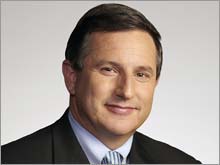|
HP's Dunn resigns from board CEO Hurd takes over as chairman amid growing leak investigation scandal. NEW YORK (CNNMoney.com) -- Hewlett Packard chief executive Mark Hurd said Friday that he is taking over as the company's chairman effective immediately, replacing Patricia Dunn, who was at the center of the company's spying scandal. Last week HP said Hurd would succeed Dunn as chairman following the company's Jan. 18 board meeting, and that she would remain on the company's board. But now Dunn will leave the board altogether, the company said.
"The unauthorized disclosure of confidential information was a serious violation of our code of conduct," Dunn said in prepared remarks. She said she was stepping down at the request of the board. HP shares jumped more than 1 percent in after-hours trading on the announcement, which was made after the market close. Hurd made the announcement at a press briefing at the company's Palo Alto, Calif. headquarters that was monitored from New York. In his first public comments since the scandal unfurled, Hurd expressed regret over the tactics used during the investigation, but said the intent of the investigation was appropriate. "The fact that we had leaks on board had to be resolved. But the inappropriate techniques that were applied do not reflect the values of Hewlett-Packard," he said. Hurd said the company still doesn't have all the facts surrounding the methods used during the probe, but the findings of an independent law firm he hired last week to investigate the leak probe were "very disturbing." The comments come as the spotlight in the HP scandal moves closer to Hurd, who took the chief executive post nearly 18 months ago. HP (Charts) emails which surfaced recently suggest Hurd played a bigger role in the surveillance of board directors, journalists and HP employees than previously thought. Hurd shed some light on his involvement in the leak probe, which included two phases - one started early last year which came up with no results and one initiated in the beginning of this year, which fingered George Keyworth as the source of the leaks. Hurd said he was aware of the investigations and knew that a fake email was sent to a reporter as part of the probe. But he said he didn't read a report the investigative team compiled which detailed the pretexting techniques used in the second phase of the investigation. Hurd declined to take questions at the briefing, but more details about his role may emerge when he testifies before a House panel next Thursday. Hurd has volunteered to testify at a hearing on "pretexting." Dunn and general counsel Ann Baskins also are slated to appear before lawmakers. The House Energy and Commerce Committee has also requested the appearance of several others involved in the probe, including investigative firms linked to the probe and HP's outside counsel Larry Sonsini. "Pretexting," a practice where someone poses as someone else to obtain personal confidential information, is at the center of the growing HP scandal that has attracted the scrutiny of California and federal authorities. So far, Hurd hasn't become the focal point of an investigation initiated by California Attorney General Bill Lockyer, who has said crimes were committed at HP and that his office has enough evidence to file charges against HP officials and outside contractors. "As of this particular moment we don't have any evidence indicating that he committed a crime," a spokesman for the attorney general told CNN Friday. Hurd, who took over the top spot at HP from Carly Fiorina in April 2005, has been the architect behind a turnaround plan that has helped the iconic printer and computer company gain ground against its rivals. In addition to cutting costs and improving margins, he's expanded HP's software business. His strategy has been well received on Wall Street. HP shares have soared 25 percent in the past year, outperforming Dell (Charts) and IBM (Charts). |
Sponsors
|

